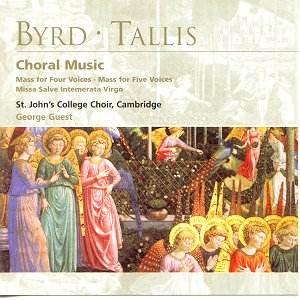William BYRD (1543 -
1623)
Mass for Four Voices 24'39"
Mass for Five Voices
23'56"
Thomas TALLIS (c1505 - 1585)
Missa Salve Intemerata Virgo*
24'38"
 St. John's College Choir,
Cambridge.
St. John's College Choir,
Cambridge.
Conductor George Guest
Recorded March 1986 and Dec 1988* DDD
 EMI Classics for Pleasure
5 74002 2
[73'13"]
EMI Classics for Pleasure
5 74002 2
[73'13"]
Crotchet
Amazon UK Amazon USA

William Byrd was a Roman Catholic in an increasingly Protestant England under
Elizabeth and her successor, James I. Through powerful support in the aristocracy
and, it is said, through his own obduracy - his reputation is of a stubborn,
cussed man - he managed to stay active in his faith in a hostile environment.
Inevitably the opportunities for performance of his Latin motets that pre-dated
his settings of the Mass were limited under the circumstances. It was only
when Byrd moved to Essex to join an titled patron and became part of the
Catholic community there that he was able, probably in secret, to attend
a Mass that would have used his own settings.
Whatever, the difficulties and problems he had, he survived and to some degree
prospered and left us a legacy of some magnificent antiphonal choral music.
Two examples are on this recording - settings of the Latin Mass for four
and for five voices (parts). Byrd also wrote a three-part setting. The St.
John's Choir - as an all male body - reflects how the voices would have been
four hundred or so years ago. The settings were written between 1592 -1595
and take the same six sections of the liturgy as their base.
The music is beautiful, hypnotic and utterly involving. In an ideal world
it should be heard sung live in one of our great cathedrals but the disc
is a good substitute. The recording captures the voices well in their big
acoustic and the strands in the parts remain clear, well-defined and blend
well together. Add near perfect diction and this is a delightful recording.
Thomas Tallis's religious affiliations were less clear cut than Byrd's were.
He tended to "keep his head down" and concentrate on his music and his livelihood
as Gentleman of the Chapel Royal and the musical duties attached to the post.
His Missa Salve Intemerata Virgo, using the same six sections as did
Byrd, is a rich work , sung mainly in four parts by a larger choir.
There are a number of good recordings of this material already available
(certainly the William Byrd) and at its bargain price this attractive release
is a worthwhile option to consider.
Reviewer
Harry Downey

